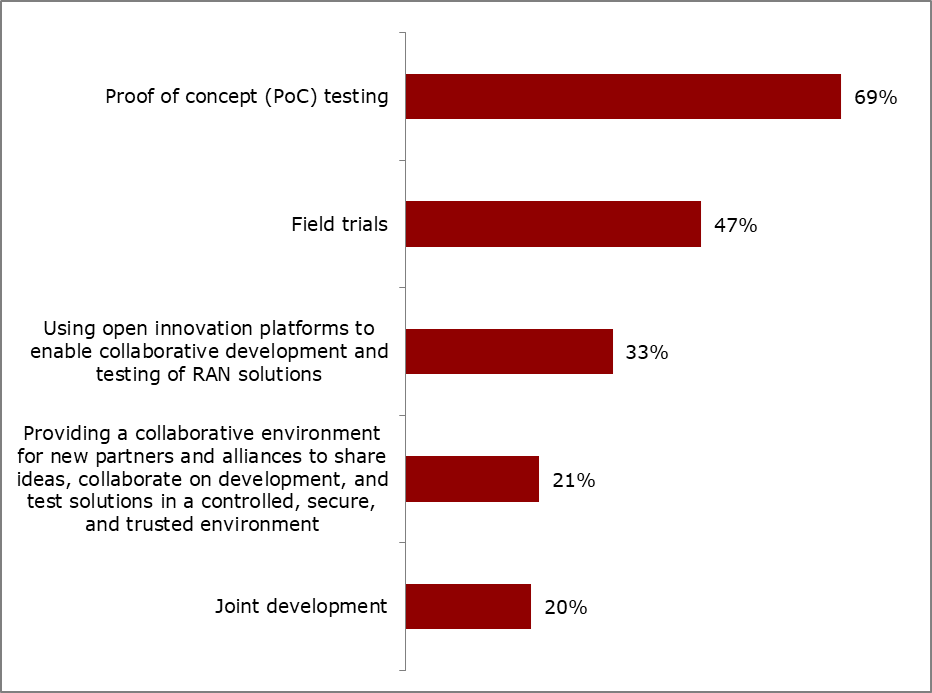
Heavy Reading’s 2023 5G Network Analytics and Automation Operator Survey results indicate that RAN testing will ensure the performance of new features but must start including collaborative methods to support knowledge growth, innovation and interop.
Test and trial practices are crucial for the RAN, as they ensure the stability, performance, viability and validation of new components or updates. Architectural and interface evolution, disaggregation of the RAN stack and automation create an environment of perpetual change that requires new operational practices.
Ecosystem collaboration is rising in prominence, driven by complexity, knowledge deficits and friendly “coopetition” (cooperative competition between RAN apps developers and vendor component partners). Collaborative RAN initiatives aim to simplify multi-vendor plug-and-play interop and streamline lengthy and time-consuming test processes like configuration mismatch and alignment across multiple components.
One question in Heavy Reading’s 2023 5G Network Analytics and Automation Operator Survey seeks to understand how operators will work with equipment vendors and software providers to test new RAN network designs, infrastructures, devices and apps. (To download a copy, click here.)
As shown in the figure below, operators confirm that traditional test practices such as “proof of concept (PoC) testing” (69%) and field trials (47%) are their preferred methods. This result is not surprising, given that both are well-established test methods. These practices often include partners but tackle different lifecycle stages. R&D teams typically run PoC testing as an early feasibility measure, with field testing reserved for acceptance criteria of new features before launch. So, it is possible that respondents may have selected both options in their two top choices (average of 1.9 choices per respondent), pushing the other options lower in the rankings.
Respondents scored “open innovation platforms to enable collaborative development and testing of RAN solutions” (33%) third. This option received less support than expected, which suggests respondents may be reflecting on technology maturity and the current number of collaborative environments in use across the ecosystem today. “Providing a collaborative environment for new partners and alliances to share ideas, collaborate on development and test solutions in a controlled, secure and trust environment” (21%) was scored fourth. Given the widespread industry dialog on RAN complexity, skill shortages and technical expertise, this test methodology’s low scoring again suggests a lack of maturity.
Finally, joint development (20%) scored the lowest of all options with respondents. Perhaps this is due to operators choosing other testing techniques in preference. Alternatively, operators may believe joint development is less flexible than the open/collaborative test environments or best suited to certain test types (e.g., multi-generational RAN assessments).
How will you work with equipment vendors/software providers to test new network designs, infrastructure, devices and apps for your RAN? (Select top two)

Source: Heavy Reading
Heavy Reading makes three conclusions based on these results:
- Operators will continue to rely on in-house test methods and various testing practices for the RAN (e.g., conceptual/feasibility testing, operational validation assessments, etc.).
- Open, innovative environments are vital for interoperability, knowledge pools/sharing and collaboration but are still maturing.
- Joint development may give less perceived flexibility than broader open or collaborative test platforms (e.g., fear of “SDK lock-in”).
Driving a new era of RAN test practices
Operational transformation requires industry support. However, several organizations and initiatives recognize the importance of collaborative test and development platforms and are driving fundamental changes to RAN testing.
- The O-RAN Alliance has instigated new development and test practices, with multi-vendor and global plugfests, testing facilities and open SDK platforms at the forefront and central to the RAN intelligent controller (RIC) and service management and orchestration (SMO) framework development.
- The Telecom Infra Project (TIP) community labs support new test approaches, hosting project labs across operators and academia. Collaborative working within the TIP OpenRAN project groups has also created a badging system to prove vendor interop and demonstrate maturity. Badging enables operators to have more confidence in interop and reduce in-house testing.
- Government bodies (e.g., the National Telecommunications and Information Administration [NTIA]) are running 5G challenges to support open, interoperable RAN solutions. A big focus is building multi-vendor cooperation and communities and developing new collaborative lab working practices and models.
RAN testing will remain crucial to operators, as it will enable them to ensure the performance and viability of new or updated features. Operators will still require several stages of testing but should start including new collaborative methods more able to support knowledge growth, innovation and interop.
For more information, check out this archived webinar.